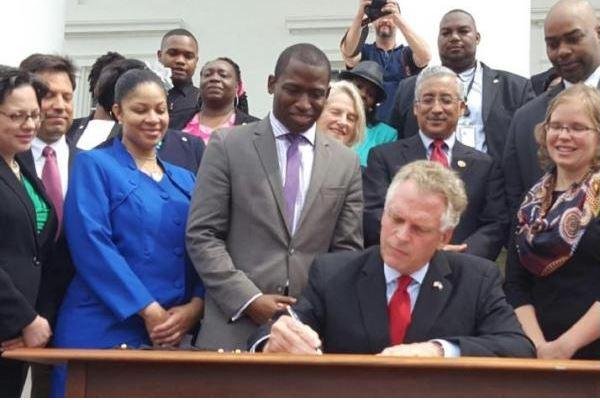Virginia Gov. Terry McAuliffe restored voting rights to some 200,000 convicted felons, also giving them the right to run for office and serve on a jury, on April 22.
Photo courtesy of Terry McAuliffe/Twitter
RICHMOND, Va., May 23 (UPI) -- Virginia's House and Senate leaders filed a lawsuit Monday to block Virginia Gov. Terry McAuliffe's executive order in April that restored voting rights to 206,000 felons.
House Speaker William Howell and Senate Majority Leader Thomas Norment are asking the Virginia Supreme Court to decide whether McAuliffe's has violated separation of powers by suspending the state's ban on voting by felons.
They argue that for several decades governors have restored voting rights only on a case-by-case basis.
"From Patrick Henry and Thomas Jefferson to Tim Kaine and Bob McDonnell, every governor of Virginia has understood the clemency power to authorize the governor to grant clemency on an individualized basis only," the suit says.
The lawsuit adds, "The governor may not issue a blanket restoration of voting rights and thus effectively suspend the Commonwealth's general prohibition on felon voting."
McAuliffe's executive order restored voting rights to all felons who had completed their sentences and been released from supervised probation or parole. It includes voting, running for public office, serving on a jury and becoming a notary public.
"Once you have served your time, and you've finished up your supervised parole ... I want you back as a full citizen of the commonwealth," McAuliffe said when announcing his order on April 22. "I want you to have a job. I want you paying taxes, and you can't be a second-class citizen."
The 61-page lawsuit says he or future governors might rewrite other parts of the state Constitution.
Norment called McAuliffe's order, "just constitutionally outrageous" during a conference call announcing the suit.
The suit seeks to prohibit election officials from registering felons and to cancel all such registrations since April 22.
Republicans have said Democrats will benefit from felons voting because of higher number of minorities who have been in prison.
According to the National Conference of State Legislatures, felons in two states -- Maine and Vermont -- never lose their right to vote even while incarcerated. Florida and Iowa felons permanently lose their right to vote although Florida, like Virginia, allow gubernatorial pardons.















